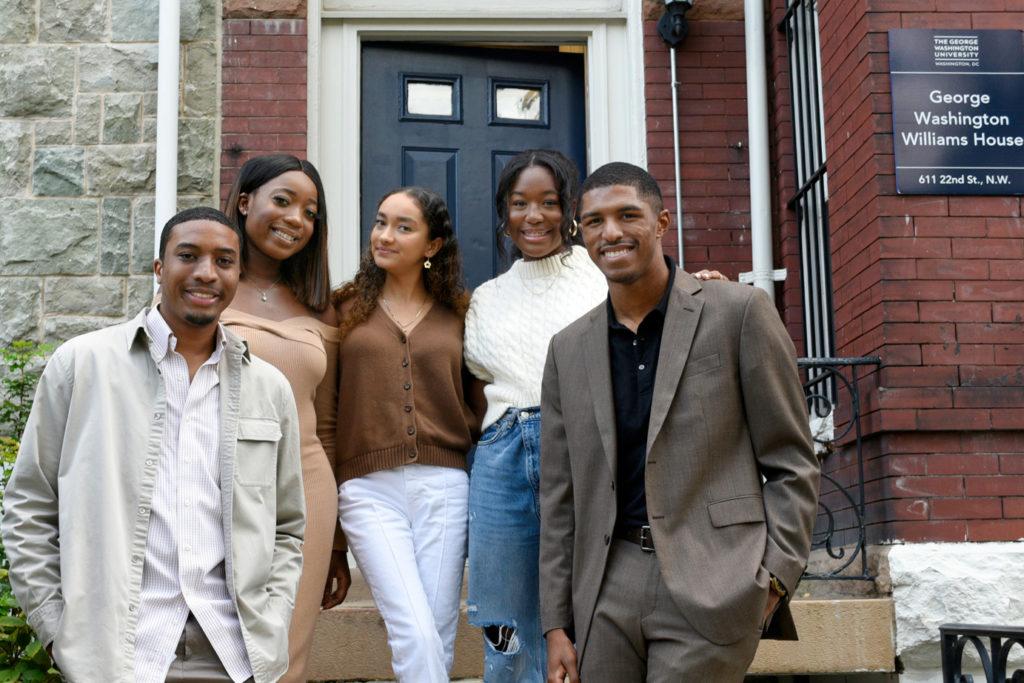After more than a year without residents and programming during the COVID-19 pandemic, the George Washington Williams House reopened this semester with increased in-person events to build back community as a hub for Black heritage and culture on campus.
The house, which is located along the 22nd Street townhouses, provides a space for Black students to live and host social, religious and informative events on campus, ranging from group gatherings to Bible studies. Residents of the house said they have hosted events each weekend since the space reopened a week before classes started to create a “safe haven” for Black students to socialize, while the house remained unoccupied for 18 months because of the coronavirus pandemic.
Bishop Walton, the president of the Williams House, said the house includes a president, a house manager and three other members help plan events without formal titles. He said members want to re-establish the house as a “second home” for Black students on campus after it was non-operational during the pandemic, now offering a space where students can gather to meet others on campus and attend social events that house members host.
“It’s been fun for us, the five of us, to live in the house too because we’ve collaborated in a way that we can put on events, but we also have our time as a house and enjoy each other and lift each other up in whatever professional endeavors that we have,” he said.
Walton said students applying to live in the house must conduct an interview with the house adviser, who asks questions about their commitments to the Black and GW communities. He said students who are accepted typically display strong leadership skills and stand out socially and academically on campus.
He said members kicked off the year with a “Welcome Back Barbecue” event at the house after the first week of classes, drawing more than 100 attendees to welcome students back to the reopened house. He said residents hosted a chat with Vice President of Student Affairs and Dean of Students Cissy Petty at the house this past Sunday and organized multiple events with student-athletes, including a meet and greet with the Black Student Athlete Alliance and a tour of the Smith Center.
“Just having a place where people can feel comfortable to come, breaking down any sort of exclusive mindsets that GW often propagates, just making people feel comfortable when we have events, like ‘Oh, we can go to the Black house’ – this is synonymous with a good time, fun, social, happiness, joy,” he said.
Raven Lucas, the house manager, said the space is a “central hub” for the Black experience on campus, where residents can decide how to host various events for the Black community on campus. She said now that the house is reopened, she hopes that events will help students make more connections on campus.
“I’m just looking forward to the community building, especially since we’ve been away from each other for so long,” she said. “I feel like it’s so nice to have that interpersonal interaction and in-person events and things of that sort, so I feel like it’ll be really beneficial.”
Lucas said social events at the townhouse now offer students a designated space to congregate and build friendships with others on campus.
“I think oftentimes for students, they may feel as though it’s a culture shock for some,” she said. “And so just having that as like a safe haven and a place where they know they could come to and have that piece of home was incredibly important.”
She said as the house manager, she planned virtual and in-person programming over the summer to prepare for the house’s reopening. She said residents planned for both in-person and virtual events over the summer to accommodate for coronavirus safety precautions, but events have remained completely in person.
“I think just being cognizant of the times, while also realizing the importance of in-person engagement and community, those two coupled together has allowed for us to really succeed so far,” she said.
Gianna Cook, a resident of the house and the president of the Black Student Union, said the house plans to continue to hold events in the future, like a midnight breakfast around finals, to continue offering a space for students to decompress. She said the house’s space for Black students to find community and meet new people on campus is especially necessary after living through the isolation of the pandemic for more than a year.
“This is a Black community, but I just think in general, I think the pandemic really socially starved us, and I think that also allowed us to go to reset,” she said. “And I think that now that we’re back on campus, with the Williams House in particular, but also in the greater GW community that we are able to just create and build a better GW.”








